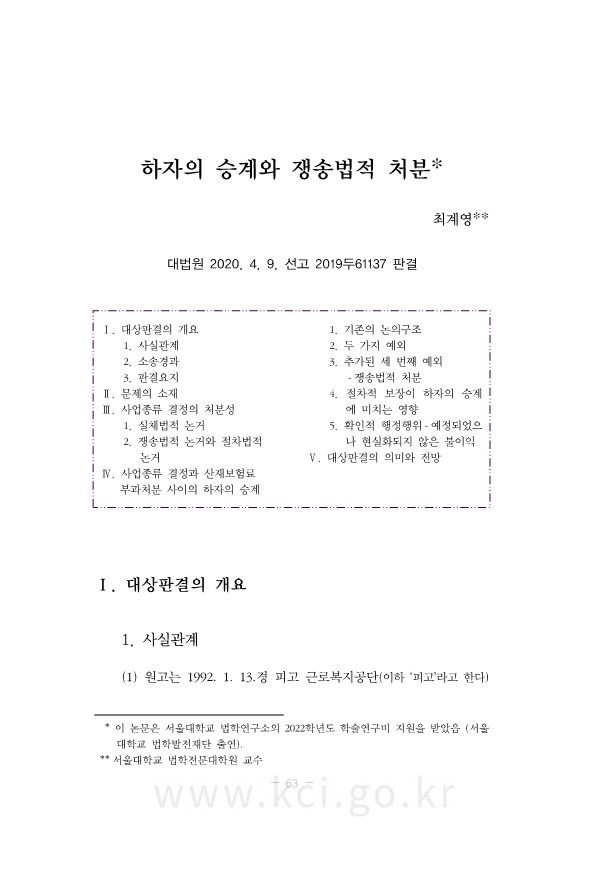국문초록
대상판결은 고용산재보험료징수법에 따른 사업종류 결정과 산재보험료
부과처분의 관계를 다루고 있다. 원심은 선행 처분인 사업종류 결정은 행정소송법상의 처분이 아니므로 이를 직접 다툴 수 없고, 후행 처분인 산재보험료 부과처분 취소소송에서 사업종류 결정의 위법성을 함께 다투어야 한다고
판단하였다. 이에 반해 대상판결은 사업종류 결정은 처분이고, 사업종류 결정의 위법성은 산재보험료 부과처분 취소소송에서 다툴 수 없다고 판단하였다.
사업종류 결정이 처분인지가 주된 쟁점이고, 사업종류 결정의 하자가 산재보험료 부과처분에 승계되는지의 문제는 일종의 방론으로 서술되었다. 그런데
이 방론 부분에서 실체법적 처분과 쟁송법적 처분을 구별하면서, 선행 처분이 쟁송법적 처분일 경우 하자가 승계된다는 새로운 법리를 제시하였다. 대상판결의 세부적 논리 전개에 모두 동의하는 것은 아니지만, 큰 방향성에 있어서는 동의할 만하다고 생각된다. 처분성이 확대되면 하자의 승계가 더 넓게 인정되어야 한다는 점, 절차적 보장 여부도 하자 승계 판단시 고려되어야
한다는 점 등이 그러하다.
나아가 장기적으로는 하자의 승계에 대한 기존의 접근방식을 다시 생각할 필요가 있다. 하자의 승계가 인정되는 예외적인 사유는 결국 적법성 보장·
권리구제의 필요성과 법적 안정성 보장의 필요성을 형량한 결과이다. 서로
결합하여 하나의 효과를 발생시킨다는 예외만으로 해결할 수 없는 처분(공시지가결정)이 나타났을 때 수인한도의 예외가 추가되었고, 처분성의 확대로
인해 위 두 가지 예외만으로 해결할 수 없는 처분들이 나타나면서 쟁송법적
처분의 예외가 추가되었다. 그러나 이렇게 예외의 목록을 늘리는 방식으로
해결하는 것이 방법론적으로 타당한지 고민해 볼 필요가 있다. 각각의 예외는 서로 다른 형량요소에 좀 더 집중하고 있을 뿐 배타적이거나 무관한 것이
아니기 때문이다. 서로 결합하여 하나의 효과를 발생시키는 경우는 선행 처분과 후행 처분의 관계에, 수인한도론은 후행 처분으로 인한 불이익에, 쟁송법적 처분론은 선행 처분의 성격에 좀 더 집중하고 있을 뿐이다. 이익형량의
요소를 보다 구체화하고 정교화하여 개별 사안에서 설득력 있는 결론을 도출하는 것이 향후의 중요한 과제가 될 것이다.
목차
Ⅰ. 대상판결의 개요
1. 사실관계
2. 소송경과
3. 판결요지
Ⅱ. 문제의 소재
Ⅲ. 사업종류 결정의 처분성
1. 실체법적 논거
2. 쟁송법적 논거와 절차법적
논거
Ⅳ. 사업종류 결정과 산재보험료
부과처분 사이의 하자의 승계
1. 기존의 논의구조
2. 두 가지 예외
3. 추가된 세 번째 예외
- 쟁송법적 처분
4. 절차적 보장이 하자의 승계에 미치는 영향
5. 확인적 행정행위 - 예정되었으나 현실화되지 않은 불이익
Ⅴ. 대상판결의 의미와 전망
외국어초록
The subject judgment deals with the relationship between the
determination of the type of business and the disposition that imposed
industrial accident insurance premiums under the Act On The Collection
Of Insurance Premiums For Employment Insurance And Industrial
Accident Compensation Insurance. The lower court judged that the
determination of the type of business, which is a prior disposition, cannot
be directly contested because it is not a disposition under the
Administrative Litigation Act but the illegality of the determination of the
type of business should be also dealt in the litigation to revoke the
disposition to impose industrial accident insurance premiums, which is a
subsequent disposition. On the other hand, the target judgment is that
the determination of the type of business is a disposition, and the
illegality of the determination of the type of business cannot be contested
in the litigation to revoke the disposition to impose industrial accident
insurance premiums. The main issue was whether the determination of the type of business is a disposition, and whether the illegality in the
determination of the type of business is succeeded to the disposition to
impose industrial accident insurance premiums was described as obiter
dictum. However, in this part, dispositions under substantive law and
dispositions under litigation law were distinguished from each other and
a new legal principle that illegality is succeeded in cases where prior
dispositions are dispositions under litigation law was presented. Although
I do not agree with all of the detailed logical development of the subject
judgment, I think that the broad directivity of the subject judgment is
agreeable. The fact that the succession of illegality should be recognized
more broadly when the range of the disposition under the Administrative
Litigation Act is expanded, and the fact that procedural guarantees should
also be considered when determining the succession of illegality are
agreeable.
Furthermore, in the long run, it is necessary to rethink the existing
approach to succession of illegality. The exceptional reason for
recognition of the succession of illegality is eventually the result of
weighing the necessity of guaranteeing legality and protection of rights
and the necessity of guaranteeing legal certainty. When a disposition that
cannot be resolved only with the exception that two dispositions
combine to generate one effect (the determination of officially assessed
land price) appeared, an exception of the tolerance limit was added, and
as dispositions that cannot be resolved with only the above two
exceptions appeared due to the expansion of the dispositions, an
exception of dispositions under litigation law was added. However, it is
necessary to consider whether it is methodologically justifiable to solve
problems by increasing the list of exceptions as such because individual
exceptions are just more focused on different weighing elements and are
not exclusive or irrelevant. Cases where two dispositions combine with
each other to generate an effect just focus more on the relationship between prior disposition and subsequent disposition, the theory of the
tolerance limit on the disadvantage caused by the subsequent disposition,
and the theory of dispositions under litigation law on the nature of prior
dispositions. It will be an important task in the future to draw convincing
conclusions in individual cases by making the elements of profit weighing
more specific and elaborate.



